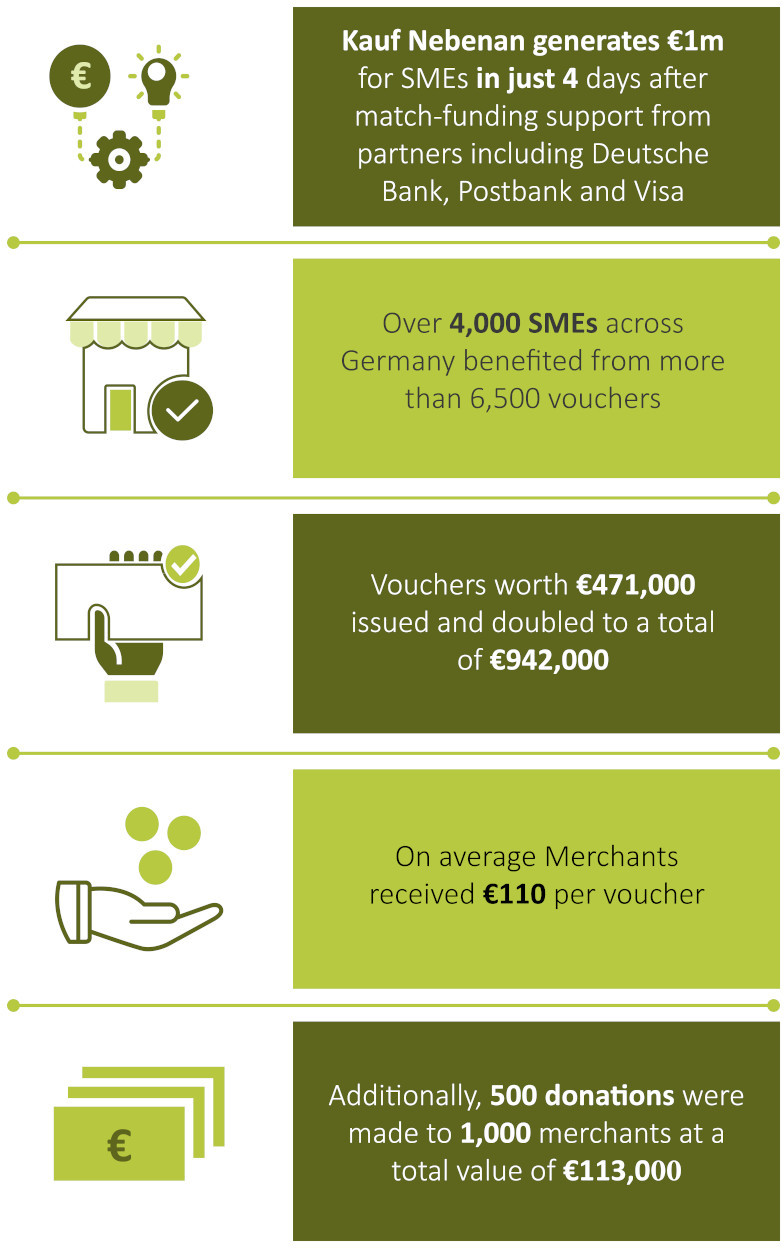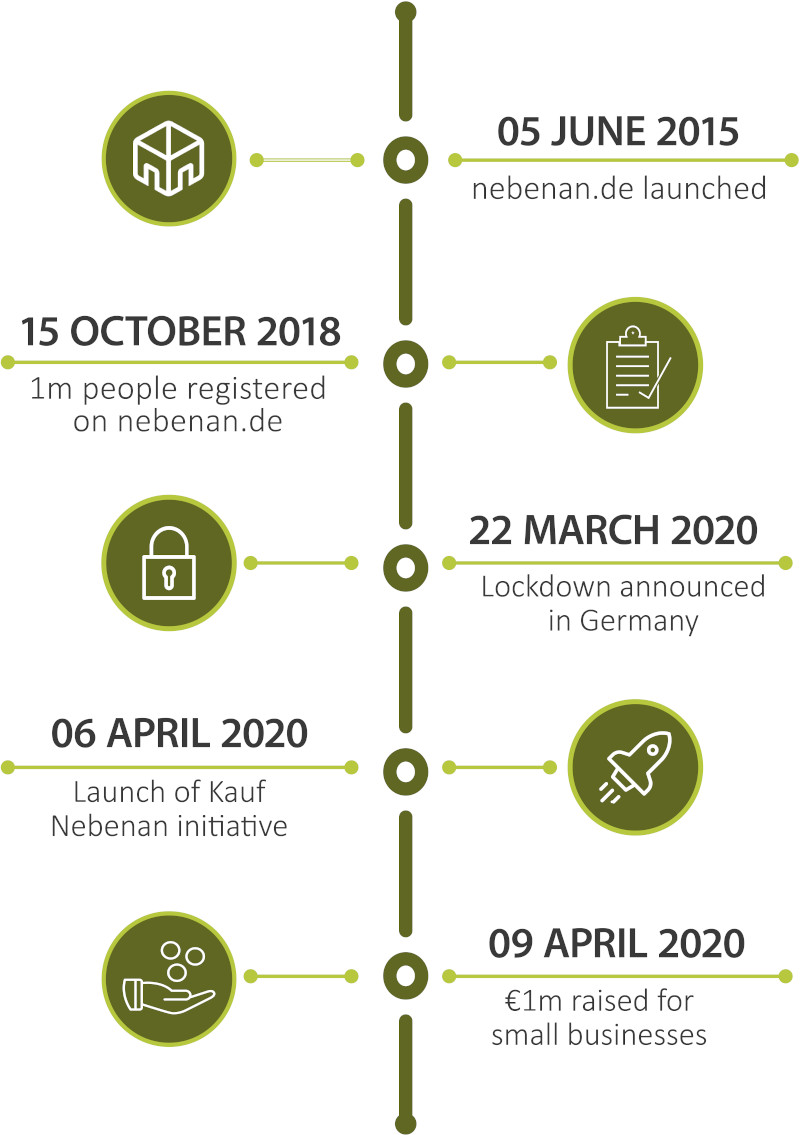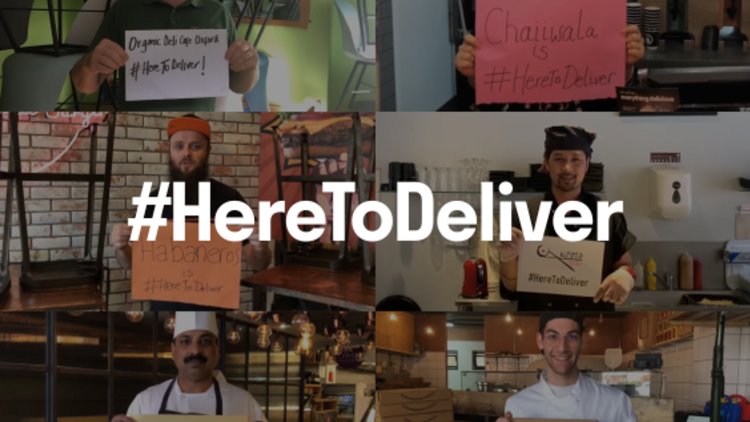WORKING ONLINE TO SUPPORT NEIGHBOURHOOD BUSINESSES OFFLINE
May 2020
From nothing to 1.6 million in less than five years. The success is counted in people and belongs to Berlin-based nebenan.de. The aim is to improve – sometimes create – physical neighbourhood communities using digital technologies. It is clearly working.
Nebenan.de, which translates into English as ‘Next Door’, facilitates sharing and exchange of goods and services. It has sister projects in France, Spain and Italy. And, though the venture pre-dates coronavirus, it has come into its own during the pandemic.
Real places are the focus. Sure, the distancing advantages of online activity are appropriate while Covid threats are high. The web supports the emerging work-at-home world as well. But economic and social lifeblood flows from high streets and town squares. They are the beating hearts of vibrant communities. Neighbours of all sorts need places shop, eat and meet. They need ‘habitats’ – and nebenan.de is set up to foster, sometimes to preserve, and always to support physical environments.
Till Behnke, nebenan.de’s founder and chief, says the enterprise was established with ambitions for communities rather than commerce. “We set out as a social impact business,” he says.
“There are people who barely know each other even though they live in the same place. Before getting together under the nebenan.de umbrella maybe people thought of their neighbours as people who stole their parking space. Afterwards, we hope people will feel they are coming home to a community.”
Meanwhile, planning for nebenan.de’s new venture – called Kauf Nebenan or ‘Buy Next Door’ – was well advanced before Covid-19 began to impact our lives. But seeing the need, nebenan.de brought forward the launch by six months. Six months work, in other words, was done within three weeks.
Kauf Nebenan is based on a prepay system. Shoppers buy vouchers redeemable for goods and services from stores, restaurants, businesses, as well as self-employed and creative professionals. The vouchers allow neighbours to support local business whenever they chose. In corona-times, cash-strapped businesses receive funding they desperately need. There was also an option to make donations.

Source: nebenan.de
Till Behnke believes local businesses are at acute Covid risk. “They can survive four weeks on their own and maybe another four weeks with government help. They are taking action themselves and we give long term support. The survivors will be the ones that adapt.”
Till Behnke believes local businesses are at acute Covid risk. “They can survive four weeks on their own and maybe another four weeks with government help. They are taking action themselves and we give long term support. The survivors will be the ones that adapt.”
Kauf Nebenan was launched on 6 April, just two weeks after the German government ordered stores across the country to close. Does it work? More than 1 million Euros were spent on more than 5,000 vouchers to support small and medium-sized businesses. So the numbers tell you it does. The scheme received an initial boost with match-funding support from partners including Deutsche Bank, Postbank and Visa.
Karusa, a gift shop in Munich specialising in handmade local products, is one of the businesses to benefit as Monika Holzhauser, owner of Karusa, explains. As declared on the nebenan.de website: “No customers equals no income! State measures alone are not enough. With a voucher you can help your favourite store quickly and directly to get through this difficult time.”
Julius Friedrich runs Wein ist Freude, a wine merchant based in Oberursel, near Frankfurt, which has also felt the direct benefits of the ‘Buy Next Door’ initiatives.
A social impact business
Neighbours themselves create the online community: usually a core of 10-20 “ambassadors” are signed up and distribute paper invitations. Around 100 people are needed for a collaboration to work and create a critical mass, according to nebenan.de’s findings. That’s when, for example, a request to borrow an electric drill is likely to be met. Larger networks, of course, bring better results.
Subscribers add to networks by inviting others to join. All must use their real names and addresses. In 2018, the networks were opened to community groups, local government and the following year to neighbourhood businesses. “Pharmacies, pubs, boutiques, hair-stylists, local festival organisers . . .” Behnke explains.
A typical nebenan.de neighbourhood comprises around 3,500 homes. In densely populated cities such as Berlin, the physical dimensions may be only 300 metres across.
Subscribers define their own neighbourhood and decide on the right name in corporation with nebenan.de and neighbours who have already registered. Then nebenan.de draws the maps where the community shops, eats out, buys take-away, and goes to gyms and parks. At the time of writing nebenan.de’s 1.6 million subscribers come from 18,000 neighbourhoods in 1,300 cities, towns and villages. There are another 600,000 users in 3,200 neighbourhoods in France, Spain and Italy.
In some senses, nebenan.de is only the catalyst. Yet its technological expertise transforms good intentions into practice. IT is a huge piece of the story: about half nebenan.de’s 80 employees are on the tech side.

Source: nebenan.de
Distinctly different
Nebenan.de networks are broadly similar to the global social media giants but also distinctly different. Like Facebook, for example, nebenan.de connects people via a social platform. But Behnke observes that Facebook or Twitter largely connect people who already know each other irrespective of where they live. Nebenan.de helps people make new connections in their immediate vicinity.
For residents and community organisations, network access is free while small levies are paid by businesses.
With the focus on local, nebenan.de combines the online with the offline. It is also serving a wider public mood. A recent survey in the UK analysed by Onward , a policy-research institute, found that 76 percent believe: “it is more important for communities to pull together locally” compared to 24 percent believe it is more important to “offer support to friends and family remotely from different parts of the country”. Nebenan.de is challenging the prevalence of anonymity that works against the best interests of most communities.
The networks invigorate innate human instincts of generosity and kindness while pulling appropriate economic levers. By enhancing cohesion, nebenan.de also make communities more secure. Says Behnke: “We did not know about coronavirus before it hit but it turns out we have spent five years building a tool that is super-helpful in these days.”
Meanwhile the nebenan.de networks are meeting corona-fed demand for neighbourhood volunteers to help those unable to leave their homes with shopping, medical supplies, dog-walking and other necessities. “These are things happening on our platform 10,000 times a day now.”
Looking ahead
Looking to the future, nebenan.de plans to target the Black Friday/Cyber Monday weekend in late November to push the benefits of its platform. It also wants to promote “Shop Local Saturdays” (Kauf Nebenan – Samstag), which happens on the last Saturday in November, among other loyalty ideas.
Nebenan.de is community commerce in action. “It’s a fantastic platform”, says Behnke “for now and post-corona times. It will, I am sure, lead people to think about where they want to shop. I am convinced that when corona is over people will think differently about their neighbours and feel differently about home.”
back to portfolio
back to portfolio

